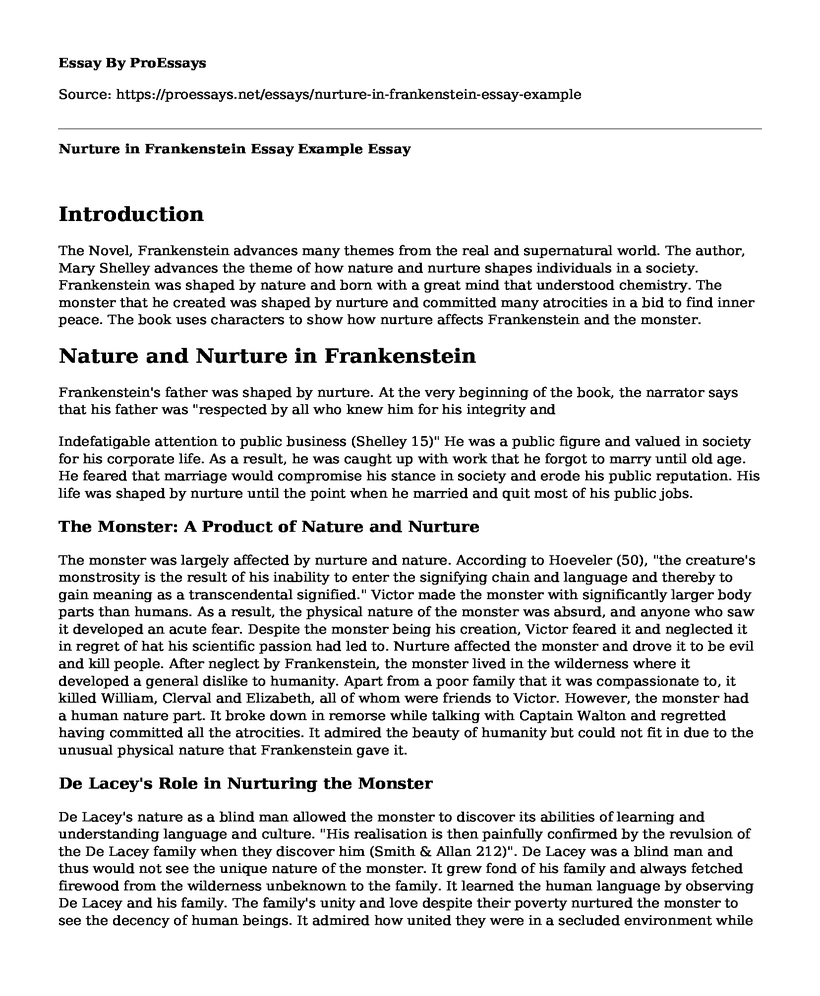Introduction
The Novel, Frankenstein advances many themes from the real and supernatural world. The author, Mary Shelley advances the theme of how nature and nurture shapes individuals in a society. Frankenstein was shaped by nature and born with a great mind that understood chemistry. The monster that he created was shaped by nurture and committed many atrocities in a bid to find inner peace. The book uses characters to show how nurture affects Frankenstein and the monster.
Nature and Nurture in Frankenstein
Frankenstein's father was shaped by nurture. At the very beginning of the book, the narrator says that his father was "respected by all who knew him for his integrity and
Indefatigable attention to public business (Shelley 15)" He was a public figure and valued in society for his corporate life. As a result, he was caught up with work that he forgot to marry until old age. He feared that marriage would compromise his stance in society and erode his public reputation. His life was shaped by nurture until the point when he married and quit most of his public jobs.
The Monster: A Product of Nature and Nurture
The monster was largely affected by nurture and nature. According to Hoeveler (50), "the creature's monstrosity is the result of his inability to enter the signifying chain and language and thereby to gain meaning as a transcendental signified." Victor made the monster with significantly larger body parts than humans. As a result, the physical nature of the monster was absurd, and anyone who saw it developed an acute fear. Despite the monster being his creation, Victor feared it and neglected it in regret of hat his scientific passion had led to. Nurture affected the monster and drove it to be evil and kill people. After neglect by Frankenstein, the monster lived in the wilderness where it developed a general dislike to humanity. Apart from a poor family that it was compassionate to, it killed William, Clerval and Elizabeth, all of whom were friends to Victor. However, the monster had a human nature part. It broke down in remorse while talking with Captain Walton and regretted having committed all the atrocities. It admired the beauty of humanity but could not fit in due to the unusual physical nature that Frankenstein gave it.
De Lacey's Role in Nurturing the Monster
De Lacey's nature as a blind man allowed the monster to discover its abilities of learning and understanding language and culture. "His realisation is then painfully confirmed by the revulsion of the De Lacey family when they discover him (Smith & Allan 212)". De Lacey was a blind man and thus would not see the unique nature of the monster. It grew fond of his family and always fetched firewood from the wilderness unbeknown to the family. It learned the human language by observing De Lacey and his family. The family's unity and love despite their poverty nurtured the monster to see the decency of human beings. It admired how united they were in a secluded environment while ravaging in poverty. It yearned to be integrated into the family and accepted as one of them.
Conclusion
Mary Shelley successfully showed how nurture affects living things. Victor's father was nurtured into a corporate enthusiast by society while his age mates were busy starting families. Victor gave the creature an abnormal nature and society nurtured it to a monstrous beast. De Lacey family nurtured humanity in the creature although it was short-lived. Both physical traits and the environment are key drivers of behavior.
Works Cited
Hoeveler, Diane. Frankenstein, feminism, and literary theory. (2003). Marquette University.
Shelley, Mary. Frankenstein. Medicine and Literature, Volume Two. CRC Press, 2018. 35-52.
Smith, Allan Lloyd. This Thing of Darkness: Racial Discourse in Mary Shelley's Frankenstein. Gothic Studies 6.2 (2004): 208-222.
Cite this page
Nurture in Frankenstein Essay Example. (2022, Sep 22). Retrieved from https://proessays.net/essays/nurture-in-frankenstein-essay-example
If you are the original author of this essay and no longer wish to have it published on the ProEssays website, please click below to request its removal:
- Research Paper Example on The Yellow Wallpapers by Charlotte Perkins
- Symbolism in Ethan Frome by Edith Wharton Essay
- Research Paper on Feminism and Marxism in the Brave New World
- Symbolism in the Poetry of Renaissance Authors Sir Phillip Sidney and Edmund Spenser
- The Yellow Wallpaper Response Paper
- Women and Power in Gilgamesh, Ramayana and the Odyssey - Essay Sample
- Essay Example on Romance and Revolution: A Journey of Self-Discovery in 'As You Like It'







